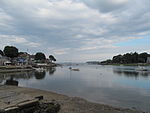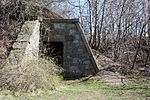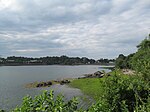Salem Willows is an oceanfront park in Salem, Massachusetts. It is named for the European white willow trees planted there in 1801 to form a shaded walk for patients convalescing at a nearby smallpox hospital. The area became a public park in 1858, and became a summer destination for residents of Boston's North Shore, many of whom escaped the heat of the city on newly popular streetcars. Construction on the amusement park began in the summer of 1877 by the Naumkeag Street Railway Company which had extended its horsecar system to the park. On June 10, 1880 the park opened with many amusement park additions. By 1911, electric streetcar service had been increased to include two tracks from Derby Street along Fort Ave. to the end of the line at what is now the parking lot at the arcade.The park covers over 35 acres and includes beaches, a pier, a yacht club, and a boardwalk with an arcade as well as take-out restaurants. There are many areas for recreational activities including social gatherings and picnicking. There are gazebos, a small stage area, and tennis and basketball courts. There is an amusement park called Kiddieland with a carousel that survives to this day with a few other rides that are for children only, as well as a miniature golf course. There are two small beaches located on the Willows which is a common place for tourists to go and see the surrounding cities and towns. The beaches are also a common place to watch the 4th of July fireworks since you can see three sets of fireworks; Salem, Beverly, and Marblehead. The Salem Trolley stops at the park.
Many establishments on Restaurant Row, the park's north side, served fresh seafood, while a carousel with carved flying horses was another special attraction. The park is near the Juniper Point neighborhood, most likely named for its juniper trees. Many of the houses there were originally occupied only during the summer, but they are now year round homes."










